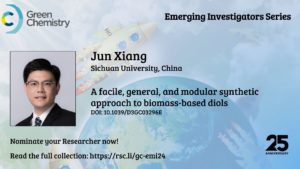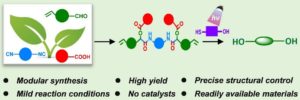Green Chemistry is proud to present the Green Chemistry Emerging Investigators Series, showcasing work being conducted by Emerging Investigators. This collection aims to highlight the excellent research being carried out by researchers in the early stages of their independent career from across the breadth of green chemistry. For more information about this series, click here
The most recent contribution to this series, a communication article entitled A facile, general, and modular synthetic approach to biomass-based diols (DOI: 10.1039/D3GC03296E), introduces a novel method for synthesizing structurally diverse biomass-based diols (BDOs) in a facile and general manner. By providing access to BDOs without the need for catalysts and using mild reaction conditions, this method aims to advance the development of sustainable materials and promote the transition from petroleum-based to biomass-based chemicals.
The motivation behind this work was to develop a more efficient and sustainable method for biomass-based diols. The ultimate goal is to foster the advancement of sustainable materials, thus promoting a more eco-friendly and sustainable future.
Read our interview with the corresponding author below.
What aspects of this work are you most excited about at the moment and what do you find most challenging about it?
I’m excited about the establishment of a powerful approach towards the production of diols derived from biomass. This approach enables us to synthesize diols with analogous structures, thereby expediting our discovery of key performance-affecting factors and facilitating the fabrication of high-performance biomass-based materials.
The challenging aspect lies in pushing this technology from the lab side into the market and achieving the goal of replacing petroleum-based materials on a large scale.
What is the next step? What work is planned?
Our research group is deeply concerned with the efficiency and safety of material preparation, as well as the recyclability of as-prepared materials. In our future research efforts, we plan to design and synthesize biomass-based diols possessing unique functionalities, endowing their derived materials with exceptional durability and recyclability, and thus reducing the adverse impact on the environment.
Please describe your journey to becoming an independent researcher.
My scholarly journey commenced as a postgraduate student at the State Key Laboratory of Polymer Materials Engineering at Sichuan University (SCU), Sichuan Province, China. It was during my doctoral studies at the University of Sherbrooke (UdeS) in Quebec, Canada, under the supervision of Prof. Yue Zhao, that I honed my expertise and skills. At UdeS, I engaged in pioneering work involving the design, synthesis, and biomedical applications of advanced functional materials derived from photo-responsive polymers. Seeking to further strengthen my training as a chemist and broaden my interdisciplinary research experiences, I embarked on a research endeavour within the laboratory of Prof. Haojun Fan at SCU, where I was acquainted with the realm of biomass-based polymeric materials and their environmentally sustainable manufacturing processes. These educational and collaborative experiences taught me how research labs work, how projects are conducted and how the lab is managed, and ultimately trained me to work as an independent researcher specializing in “biomass-based energy and materials”.
Can you share one piece of career-related advice or wisdom with other early career scientists?
“Choosing an important problem.”
Why did you choose to publish in Green Chemistry?
Green Chemistry is a top-tier, highly respected journal in Chemistry with a broad readership and followers all over the world. This journal encourages the design and synthesis of safer chemicals, the use of renewable resources, and the minimization of waste and pollution. Our current article aligns perfectly with the scope of this journal; hence it has inspired me to publish our work in this prestigious journal.
Meet the author
 Jun Xiang is an Associate Professor in the College of Biomass Science and Engineering at Sichuan University. He currently works on developing more efficient and eco-friendly methods to accelerate the substitution of petroleum-based chemicals with biomass feedstocks. Dr Xiang earned his MSE from Sichuan University in 2013 and later completed a PhD in chemistry at the University of Sherbrooke in 2018, supported by the merit scholarship program provided by FRQNT. His professional journey commenced in December 2018. Starting in 2022, he became a committee member at ACS South western China Chapter and leads the subject of biomass-based energy and materials.
Jun Xiang is an Associate Professor in the College of Biomass Science and Engineering at Sichuan University. He currently works on developing more efficient and eco-friendly methods to accelerate the substitution of petroleum-based chemicals with biomass feedstocks. Dr Xiang earned his MSE from Sichuan University in 2013 and later completed a PhD in chemistry at the University of Sherbrooke in 2018, supported by the merit scholarship program provided by FRQNT. His professional journey commenced in December 2018. Starting in 2022, he became a committee member at ACS South western China Chapter and leads the subject of biomass-based energy and materials.












